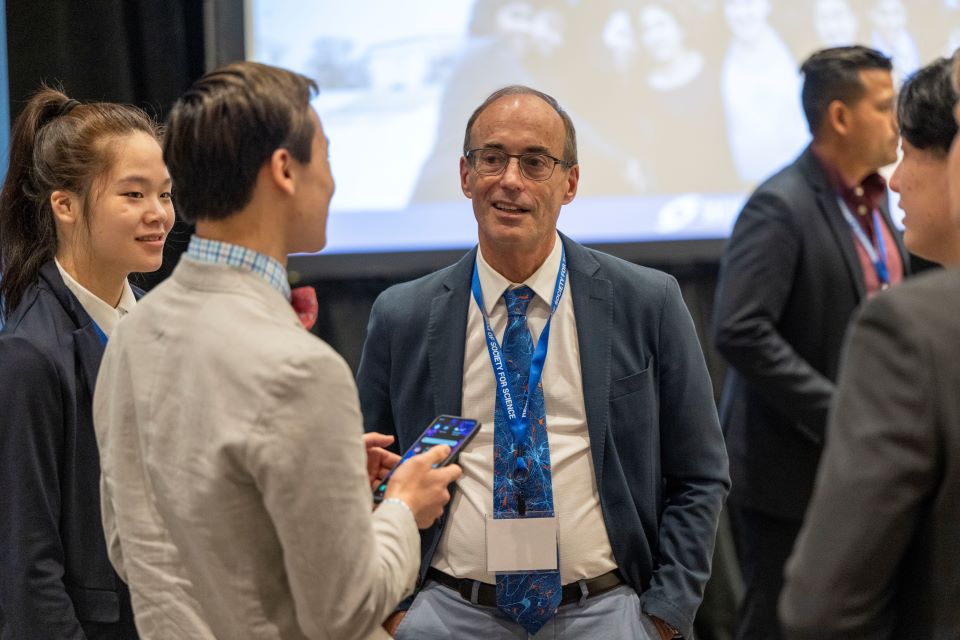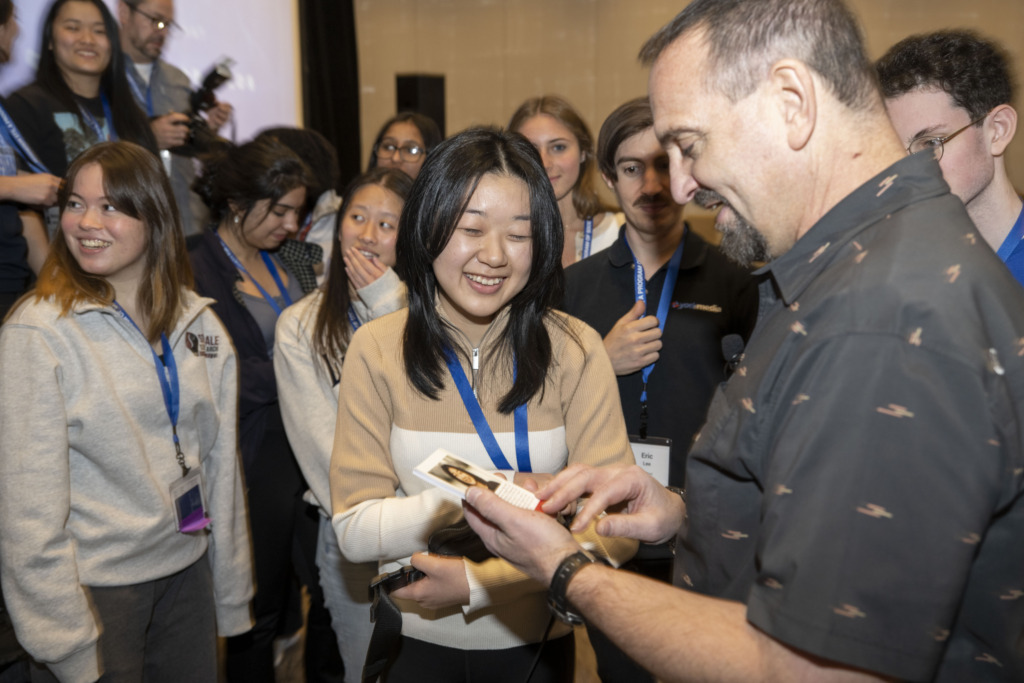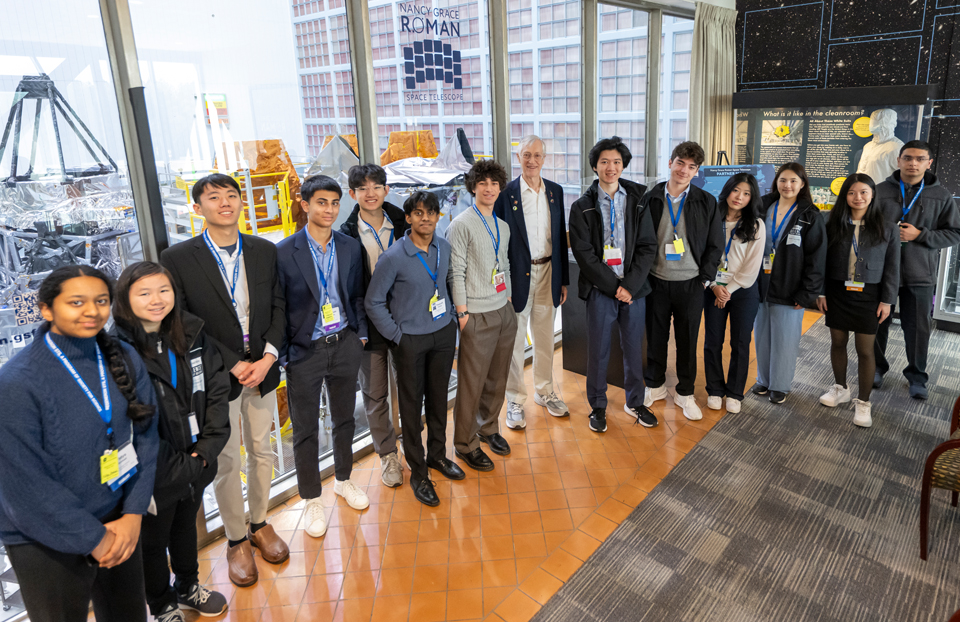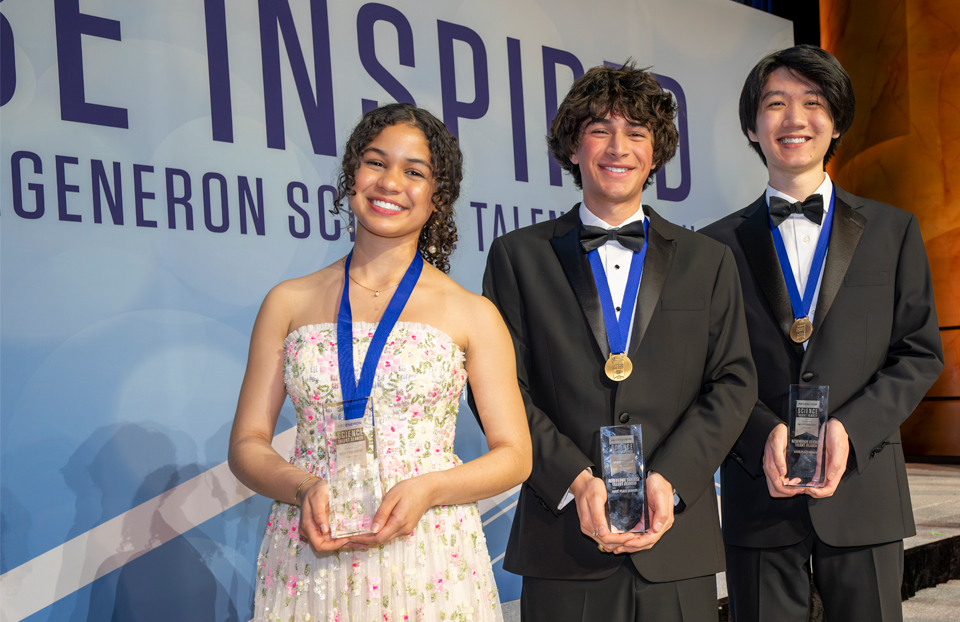Celebrating National Mentoring Month with Regeneron STS 2024 scholars and finalists

January is National Mentoring Month! To celebrate, we asked a few of our accomplished Regeneron Science Talent Search scholars and finalists to tell us about the mentors that helped guide them in their research and nurture their STEM interests. Keep reading to hear how these high schoolers found leaders in their fields who helped them take their projects to the next level.
Saraswathy Amjith (STS 2024 finalist)
Tesla STEM High School, Redmond, Washington
Project Title: A Novel Integrated Machine Learning Approach Utilizing Radar and Satellite Imagery for Selective Logging Remote Sensing Detection and Accompanying AI-Logging Map-Generating Webtool
Saraswathy found her mentor by sending cold emails to around one hundred Ph.D. candidates and professors. She finally received a response from Joshua Fan, a Ph.D. candidate at Cornell University, who had expertise in computational sustainability and agreed to mentor Saraswathy in her research.
Aarav Arora (STS 2024 finalist)
Del Norte High School, San Diego, California
Project Title: A Mechanistic Basis for the Analysis of SARS-CoV-2 Omicron Variant Severity
“I met my mentor, Dr. Subramaniam, by emailing him and showing interest in the research that his lab was working on,” Aarav shared. His mentor, Dr. Shankar Subramaniam, who leads the Subramaniam Lab in the Bioinformatics and Systems Biology department at the University of California, San Diego, met regularly with Aarav to discuss his research and touch base on next steps. While Aarav worked on most of his project on his own, Dr. Subramaniam was very supportive when he came across any roadblocks and provided feedback on how best to structure the steps of his project as he proceeded.
Arav Bhargava (STS 2024 finalist)
The Potomac School, McLean, Virginia
Project Title: Low-Cost, 3D-Printed, Universal-Fit, Transradial Socket for Amputees in Developing Countries
While most of Arav’s research was done independently, he worked with a mentor at his high school who gave him guidance and feedback on research protocols, strategies and design approaches. Arav’s project tackled a new design for a prosthetic limb, and he was able to get professional feedback on the biomedical engineering aspects of his design from Ben Koch of Medical Center Orthotics and Prosthetics and Dr. Quentin Sanders of George Mason University. Ben Koch also connected Arav with several amputees who were willing to help test his prosthetic design.
Gavriela Beatrice Kalish-Schur (STS 2024 finalist)
Julia R. Masterman High School, Philadelphia, Pennsylvania
Project Title: IRE1 Knockdown Leads to an Anxiety Phenotype in Drosophila and Changes in BiP and BDNF Levels
Gavriela was interested in joining a neuroscience lab and contacted several researchers to make that happen. Dr. Nirmala Nirinjini Naidoo, a research associate professor at the Perelman School of Medicine at the University of Pennsylvania, responded and invited Gavriela to join her lab, where she began doing work for several ongoing projects on sleep. There, she also learned lab techniques under the supervision of Ewa Strus, a member of the lab. “I then approached Dr. Naidoo with my idea to study anxiety,” Gavriela shared. After designing and executing her experiments Gavriela reached out to Dr. Theodore Drivas, a clinical geneticist at Penn Medicine, for a collaboration with Penn Medicine BioBank to continue her project.
Saathvik R. Kannan (STS 2024 scholar)
David H. Hickman High School, Columbia, Missouri
Project Title: Revolutionizing Cancer Drug Discovery with DrugGen: Identifying a Novel Drug for DNA Polymerase θ
“During the pandemic, I wanted to combine my computational skills with biology to address problems around the evolution of the COVID-19 virus,” Saathvik shared on the roots of his project. In 2020, Saathvik was watching his local news network, KOMU, and saw a story covering the work being done by Dr. Kamlendra Singh and his team at the University of Missouri’s Christopher S. Bond Life Sciences Center on potential antiviral drugs for COVID-19. After meeting Dr. Singh over Zoom, Saathvik expressed his interest in bringing together his passions for computer science and biology and requested the to work with Dr. Singh and was incredibly grateful when he agreed to help guide him on his research.

COURTESY OF SOCIETY FOR SCIENCE/CHRIS AYERS PHOTOGRAPHY
Rania Khan (STS 2024 scholar)
Charles E. Gorton High School, Yonkers, New York
Project Title: Combined Sewer Overflow Neutralizing Agent Sodium Hypochlorite (NaOCl) Ramifications on the Vitality of the Tetraselmis Population Within the Hudson River
Rania Khan met her mentor, Ryan Palmer, while taking a water ecology course at a local nonprofit. “The Director for the Center for the Urban River at Beczak, [Ryan], had mentioned the topic of combined sewer systems which grabbed my attention,” Rania said. “I went to discuss it with him after class and he told me more about it as well as telling me that there was a plethora of information about this available online.” She pursued her research on her own, but Ryan served in an advisory role throughout Rania’s project, and she continued to reach out to him with clarifying questions and kept him updated on competition opportunities.
Collin Liou (STS 2024 scholar)
Sequoia High School, Redwood, California
Project Title: Programmable Multistability and Rigid Flattenability in Origami Cubes by Adding a Minimal Cut
Collin Liou first met his mentor, Savannah Cofer, a Ph.D. candidate in mechanical engineering at Stanford University, when he requested access to her old PowerPoints, originally created for an origami-mathematics course she taught at Rice. After exchanging emails about Savannah’s current research into transformable origami robots, she created a summer research position for Collin in her lab and offered to help him with his research. Throughout the research process, Savannah checked in with Collin regularly, giving him design suggestions and helping with data collection and code.
Ekansh Mittal (STS 2024 finalist)
Westview High School, Portland, Oregon
Project Title: Harnessing Machine Learning and 3D Spheroid Cultures to Identify Biomarkers for Combating Drug Resistance in Breast Cancer.
After emailing over 15 faculty members in computational biology at Oregon Health & Science University (OHSU), Ekansh heard back from Dr. Jeremy Goecks who agreed to help him. Ekansh worked closely with a Ph.D. student in Dr. Goecks’ lab, Raphael Kirchgaessner, who held weekly meetings for troubleshooting and brainstorming while Dr. Goecks provided broader, overarching support. After his project’s initial computational analysis, Ekansh reached out to several additional OHSU labs for help testing his identified targets. After connecting with Dr. David Qian, Ekansh received guidance in experimental design and techniques which helped him ultimately collect and analyze the data he needed himself.
Ramon Moreno Jr. (STS 2024 finalist)
Thousand Oaks High School, Thousand Oaks, California
Project Title: The Influence of Isonicotinamide on the Chronological Lifespan of Saccharomyces cerevisiae Strains
Ramon Moreno Jr. found his mentor, Dr. Jessica Smith of the NIH, by first reaching out to another researcher who thought Dr. Smith would be a better match for Ramon’s work. The two emailed frequently on questions and procedural inquiries Ramon came across during his research. “This became a productive outlet for me to reflect on the outcomes of particular procedures and express any concerns as the experiment progressed,” Ramon said. They also occasionally spoke via Zoom for more detailed conversations on Ramon’s project.
Cindy Pyo (STS 2024 scholar)
Tenafly High School, Tenafly, New Jersey
Project Title: Metabolic Program of Intestinal Stem Cell in Pediatric Development and Inflammatory Bowel Disease
In the summer of 2021 Cindy embarked on a challenging journey to seek out a STEM mentor. She sent cold emails to thirty local college professors in her areaa of interest: tissue engineering and development biology. After many rejections she connected with Dr. Chia-Wei Cheng at the Columbia Stem Cell Initiative and gained the opportunity to learn under her. Dr. Cheng trained Cindy on experimental protocols required for her independent project. Once she began the experiments were conducted under Dr. Cheng’s supervision. In addition, Dr. Cheng took the time to have weekly one-on-one meetings with Cindy, first to help develop her hypothesis and engineering goals, and then to discuss her interpretation of the data.


